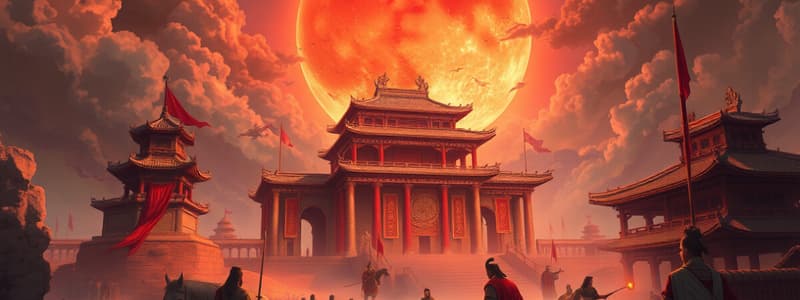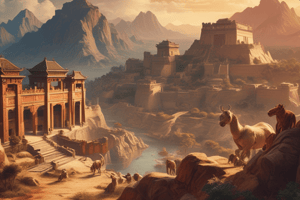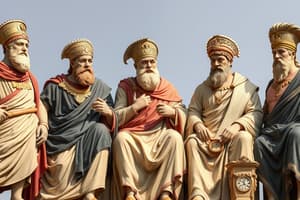Podcast
Questions and Answers
Which system of government was established in Rome after the elimination of kingship in 507 B.C.E.?
Which system of government was established in Rome after the elimination of kingship in 507 B.C.E.?
- Democracy
- Monarchy
- Republic (correct)
- Oligarchy
The Roman Senate was composed primarily of wealthy landowning families.
The Roman Senate was composed primarily of wealthy landowning families.
True (A)
Who were the two consuls in the Roman Republic responsible for?
Who were the two consuls in the Roman Republic responsible for?
They were responsible for governing and making laws in Rome.
The Roman Empire encompassed all the lands surrounding the __________ Sea.
The Roman Empire encompassed all the lands surrounding the __________ Sea.
What is the term used to describe the period of relative peace and stability across the Roman Empire from 27 B.C.E. to 180 C.E.?
What is the term used to describe the period of relative peace and stability across the Roman Empire from 27 B.C.E. to 180 C.E.?
Match the following terms with their descriptions:
Match the following terms with their descriptions:
Roman culture valued the contributions of entertainers such as dancers and musicians as depicted in mosaics.
Roman culture valued the contributions of entertainers such as dancers and musicians as depicted in mosaics.
Which geographical feature was identified as a significant boundary for the Roman Empire?
Which geographical feature was identified as a significant boundary for the Roman Empire?
What event occurred around 200 CE in relation to Christianity?
What event occurred around 200 CE in relation to Christianity?
Romans were entirely satisfied with their traditional religion prior to the rise of Christianity.
Romans were entirely satisfied with their traditional religion prior to the rise of Christianity.
What engineering achievement was crucial for supplying water in Roman towns?
What engineering achievement was crucial for supplying water in Roman towns?
The Roman Empire was replaced by the _____ Empire after its collapse.
The Roman Empire was replaced by the _____ Empire after its collapse.
Match the following Qin policies with their descriptions:
Match the following Qin policies with their descriptions:
Which emperor is associated with the unification of China through legalism?
Which emperor is associated with the unification of China through legalism?
In Imperial China, family was not considered the basic unit of society.
In Imperial China, family was not considered the basic unit of society.
What was a major challenge for Roman officials regarding urban development?
What was a major challenge for Roman officials regarding urban development?
Which of the following best describes the status of Roman women in society?
Which of the following best describes the status of Roman women in society?
Romans worshiped only a few major gods.
Romans worshiped only a few major gods.
What was the primary reason for Rome's expansion during its history?
What was the primary reason for Rome's expansion during its history?
Trajan's Column commemorates his campaign in ______.
Trajan's Column commemorates his campaign in ______.
What contributed to the failure of the Roman Republic?
What contributed to the failure of the Roman Republic?
The Roman governor served unlimited terms in office, ensuring stability.
The Roman governor served unlimited terms in office, ensuring stability.
What was created by large landowners that relied on cash crops?
What was created by large landowners that relied on cash crops?
Match the following terms with their descriptions:
Match the following terms with their descriptions:
What was the purpose of the Silk Burial Banner from Mawangdui?
What was the purpose of the Silk Burial Banner from Mawangdui?
The Han dynasty was characterized by strong leaders and economic prosperity.
The Han dynasty was characterized by strong leaders and economic prosperity.
Name one advancement in technology that developed during early Imperial China.
Name one advancement in technology that developed during early Imperial China.
Buddhism was introduced to China from ______.
Buddhism was introduced to China from ______.
Match the following issues faced by the Han dynasty with their descriptions:
Match the following issues faced by the Han dynasty with their descriptions:
Which of the following was a similarity between the Roman Empire and the Han dynasty?
Which of the following was a similarity between the Roman Empire and the Han dynasty?
During the Han dynasty, the majority of the population lived in urban areas.
During the Han dynasty, the majority of the population lived in urban areas.
What significant infrastructural project was built to connect the North and South in China?
What significant infrastructural project was built to connect the North and South in China?
Which dynasty succeeded the Qin dynasty in China?
Which dynasty succeeded the Qin dynasty in China?
The Third-Century Crisis marks a period of stability and growth in the Roman Empire.
The Third-Century Crisis marks a period of stability and growth in the Roman Empire.
What significant event occurred in 31 B.C.E. regarding Augustus?
What significant event occurred in 31 B.C.E. regarding Augustus?
In 264-202 B.C.E., Rome fought wars against _____ to secure control of the western Mediterranean.
In 264-202 B.C.E., Rome fought wars against _____ to secure control of the western Mediterranean.
Match the following events with their corresponding dates:
Match the following events with their corresponding dates:
Study Notes
Overview of Empires: Rome and Han China
- The Roman Empire expanded around the Mediterranean and parts of Europe, facing challenges in border defense from Germanic and Central Asian invaders.
- Geographical advantages included natural boundaries like deserts and seas, but lengthy river borders were vulnerable.
Roman Republic (753–31 B.C.E.)
- Kingship abolished in 507 B.C.E., leading to the establishment of a republic governed by two consuls and the Senate.
- Society was hierarchical, with political power concentrated in wealthy landowning families.
- Patriarchal structure; women had limited rights and were subordinate to male guardians.
Roman Expansion and Governance
- Expansion primarily driven by greed, aggressiveness, and fear of attack.
- Relied on local elites for provincial administration and taxation; governors often corrupt due to short-term appointments.
Culture and Society
- Roman society emphasized status; elite families commemorated ancestors through portrait busts.
- Religion included a pantheon of gods and spirits, reflecting Roman values and societal structure.
Decline of the Roman Republic
- Economic shifts led farmers to military service, while large landowners created latifundia, focusing on cash crops over staple food production.
- Increasing reliance on slave labor resulted in a growing unemployment underclass.
- The loyalty of soldiers shifted from the state to military commanders, contributing to civil wars that dismantled the republican government.
Transition to Empire (31 B.C.E.–330 C.E.)
- Christianity emerged as a significant minority by 200 C.E., gaining traction while traditional Roman religious practices waned.
- Engineering advancements, such as aqueducts, improved infrastructure but also highlighted state challenges, including border raids and military reliance on mercenaries.
Han Dynasty (221 B.C.E.–220 C.E.)
- Society in Han China was deeply hierarchical, focusing on family and ancestor reverence, with elder males in authority.
- The Qin dynasty ushered in unification through harsh Legalist methods and strong central governance under Emperor Shi Huangdi.
Achievements and Innovations of the Han
- Noted for contributions in record-keeping, astronomy, infrastructure (such as the Grand Canal), and the introduction of Buddhism from India.
Decline of the Han Dynasty
- Faced internal decay characterized by weak leadership, revenue drops, military reliance on mercenaries, and peasant uprisings due to overtaxation.
- Nomadic incursions exacerbated the instability, culminating in the dynasty's fall.
Roman vs. Han Empires: Similarities and Differences
- Both empires primarily agrarian, centralized authority to diminish aristocratic power, and expanded using local governance.
- Differences included China's unification under a dynastic cycle, while Rome experienced civil wars; also contrasting political ideologies and social mobility opportunities.
Key Vocabulary
- Republic: A form of government where representatives are elected.
- Senate: Governing body in Rome composed of aristocratic members.
- Augustus: First Roman Emperor, founder of the Principate.
- Pax Romana: Period of peace and stability in the Roman Empire.
- Aqueduct: Infrastructure to transport water from distant sources.
- Constantine: Roman Emperor who established Constantinople as the new capital.
Chronological Milestones
- 753 B.C.E.: Founding of Rome.
- 507 B.C.E.: Establishment of the Roman Republic.
- 221 B.C.E.: Qin unification of China.
- 202 B.C.E.: Establishment of the Han dynasty following the Qin.
- 220 C.E.: Fall of the Han dynasty.
Studying That Suits You
Use AI to generate personalized quizzes and flashcards to suit your learning preferences.
Related Documents
Description
Explore the significant aspects of the Roman Empire and Han China, including their governance, social structures, and expansion strategies. This quiz will test your knowledge on the differences and similarities between these two powerful empires from ancient history.




